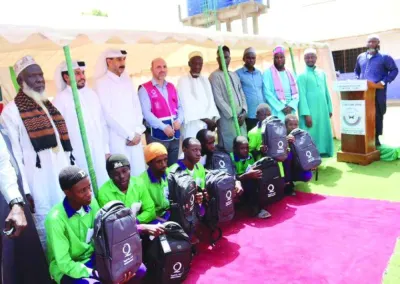The recently released implementing rules and regulations (IRR) of the Philippines’ Real Estate Investment Trust (REIT) law would help attract Qatari foreign direct investment (FDI) to the Southeast Asian nation.
“REITs are known to be property-based stock products with legal mechanisms that allow investors to earn from various income-generating real estates as assets,” the Association of Filipino Realtors & Entrepreneur Executives in Qatar (Afreeq) said in a statement.
“This financial vehicle has been in practice in many countries and has managed to gain popularity in recent years,” the statement said, adding that the Philippines’ REIT law was enacted in 2009 through Republic Act 9856.
The IRR was released last month by the Philippine’s Securities and Exchange Commission (SEC) and the Bureau of Internal Revenue (BIR) with the approval of the country’s Department of Finance (DoF) in a signing ceremony attended by DoF Secretary Carlos G Dominguez and Congresswoman Sharon S Garin, chairperson of the House Committee on Economic Affairs.
With the new IRR in place, Afreeq stated that the prospect of investing in Philippine REITs “has become more attractive as investors would now enjoy the convenience of fractional investing across various income generating real estate properties through a diversified portfolio under a globally-competitive legal framework similar to successful REITs in Asia, particularly those in Malaysia, Korea, Hong Kong and Japan, not to mention the benefits of the recent amendments in terms of taxation and other perks.”
Afreeq chairman Joseph Timothy Rivera said, “Philippine REITs would now open doors to more foreign direct investments from Qatari businessmen and other successful Qatar-based holding companies engaged in the global property industry.”
Rivera said Qataris will now have the opportunity to a range of various Philippine asset-backed securities, “in addition to traditional direct real estate investment options within generous foreign ownership limitations imposed under the Philippine law.”
“With the REIT framework, the income potential for each investment as spread across several units and would certainly reduce the risk of income losses due to unforeseen market performances of individual real estate properties,” Rivera pointed out.
Similarly, Rivera stressed that Philippine REITs would also benefit Overseas Filipino Workers (OFWs) across the globe and Filipino expats living in Qatar.
“They may now invest in the Philippine property market with the same diversified portfolio across several assets made available to big ticket investors without the need of purchasing one whole individual property,” he said.
Rivera also welcomed the recent announcement of Philippine developer, Ayala Land, which recently filed its application for a REIT offering to the SEC, “with other prime developers in the Philippines expected to follow suit in the coming months.”
“With most Philippine property developers having representative offices in Doha, we are optimistic on the prospects that REIT investment opportunities would soon be available to investors both OFWs and other nationalities in Qatar,” said Rivera, who is also an investment promotions partner of the Philippine Economic Zone Authority (Peza) in the Middle East.
“The prospects of having REIT companies investing as an ecozone developer or ecozone facilities company entitled to fiscal incentives for eligible projects is now being studied by the Policy & Planning Department of Peza. Recent proposals for crowdfunding of economic zones would attract more investments through the REIT framework,” he added.

u201cPhilippine REITs would now open doors to more foreign direct investments from Qatari businessmen and other successful Qatar-based holding companies engaged in the global property industry,u201d says Rivera.



